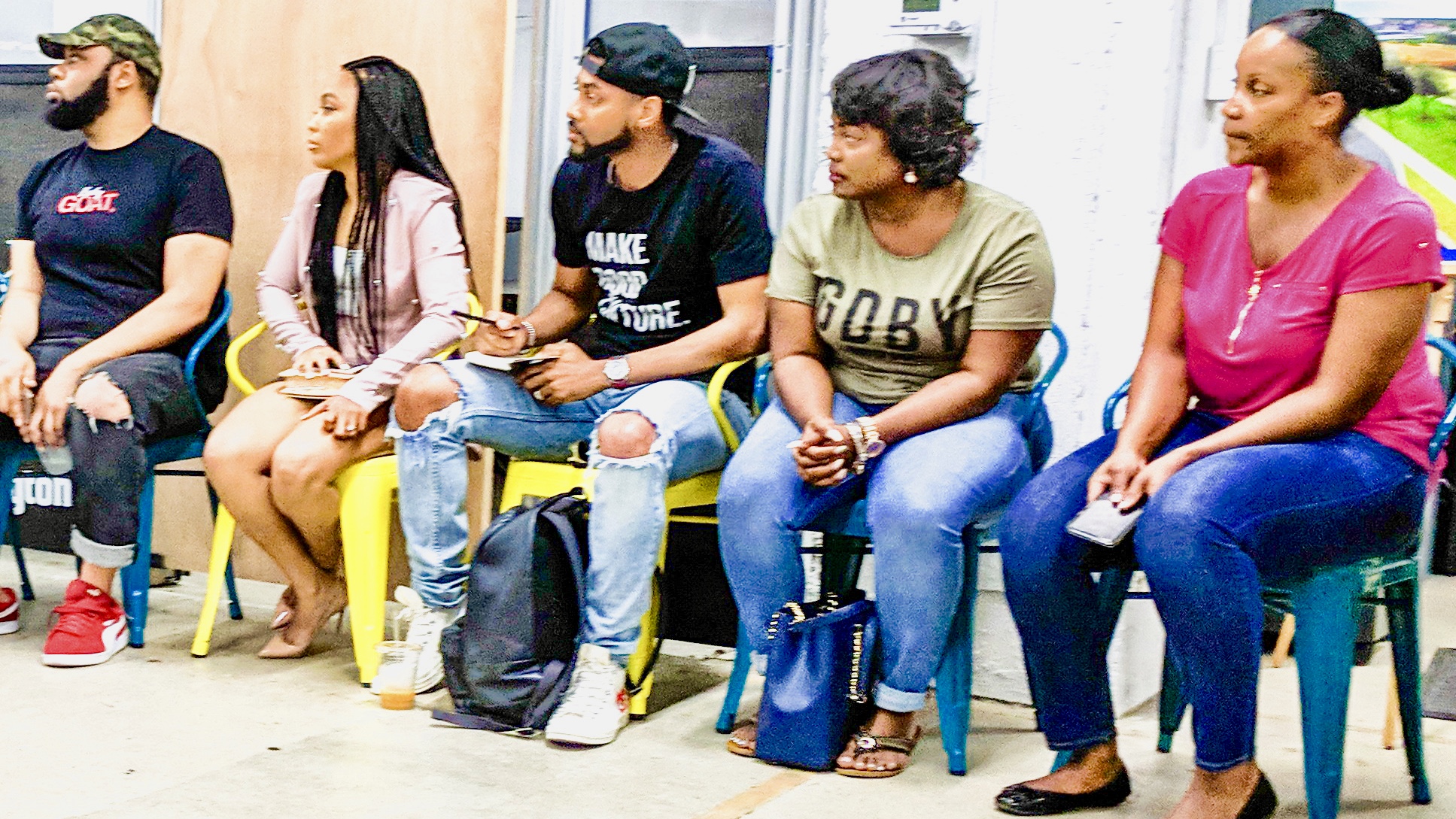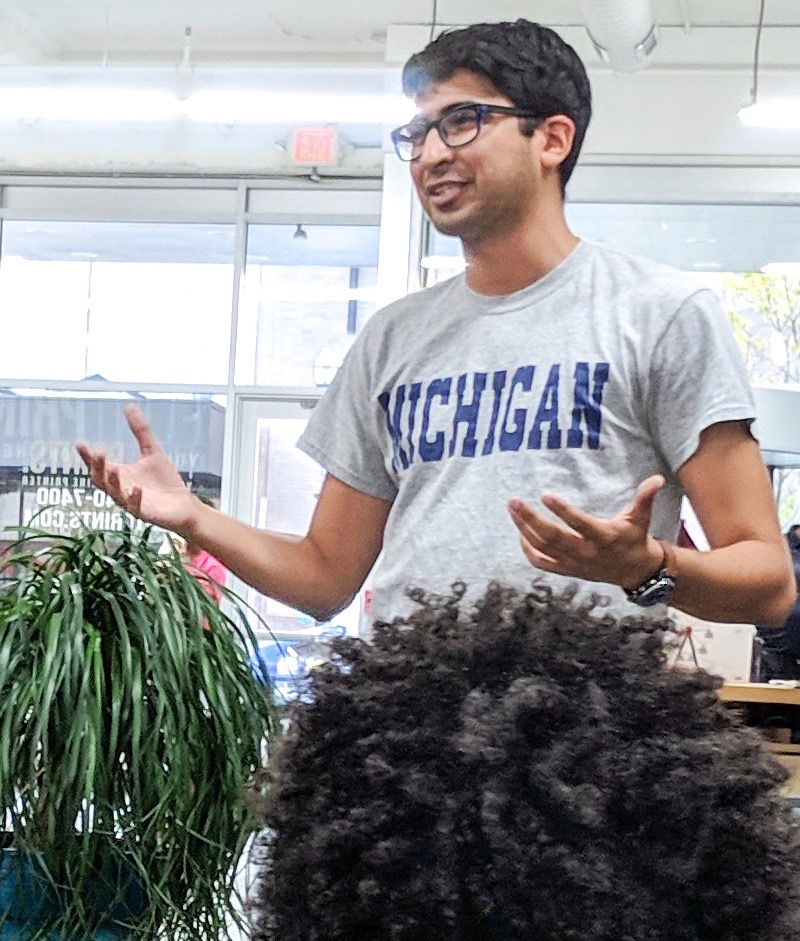By Meghan Christian
What attracts millennials to Flint? And after they get here, what might make them stay?
Various City of Flint officials, including Mayor Karen Weaver and Third Ward Councilperson Santino Guerra and representatives from area employers Huntington Bank and the Flint & Genesee Chamber of Commerce, continued their efforts to find out Sept. 18, when they met with about 25 Flint millennials to discuss problems and solutions from the millennial perspective at the Ferris Wheel Building downtown.
The reception was a follow up to a previous Millennial Day event held at City Hall Aug. 23.
According to the Pew Research Center, “Millennials” refers to the generation born between the years 1981 and 1996, meaning they range in age from 22 to 36 years old.

Millennials at City Hall-sponsored event (from left) Brandon Corder, Kyona McGhee, Isaiah Oliver (president and CEO of the Community Foundation of Greater Flint), Amari Myles and DeAndra Larkin (Photo by Meghan Christian),
Flint Public Information Officer Candice Mushatt, herself a millennial, provided opening remarks detailing the purpose of the event and what the City wanted millennials in attendance to get out of the event. “[The Mayor] wanted this to be a comfortable space where we can talk and share our ideas,” Mushatt said.
In her remarks, Mayor Weaver urged the millennials to be open about what they viewed to be issues within the City of Flint so that officials could come to possible solutions with the millennial population in mind.
“I have always wondered what we need to do in the City of Flint to keep young people here,” she said.“What do we need to be pushing for?”
Responses covered three main topics: real estate, jobs and other economic opportunities, and the public perception of the City.
Real estate and incentives to buy or start up
UM-Flint student and Flint resident Colin Roedel asked if the City would consider implementing real estate incentive programs targeting students or recent graduates from the area’s colleges and universities.
“Something I noticed is a lot of students come here and study, and then after that they leave,” Roedel said when asked what kinds of incentives he thought would entice fellow millennials to stay in the city. “So maybe some kind of incentive would be…a community fund that helps these individuals on a down payment…or something along those lines,” he added.
Linnette Phillips, deputy director of economic development, noted there already are current incentives that benefit teachers who work in the city. “But those could be expanded to look into colleges and recent graduates as well,” Phillips said. “We are looking to our students, our young people, our millennials, to grow our population.”
Nic Custer, resident and former EVM managing editor, also touched on the importance of engaging millennials in the real estate market. “One of the things we have…is a lot of young people who need prime real estate for their sales, for their businesses, for their ventures,” Custer said, adding that perhaps financing should be available to young people who are starting a business in any of the older commercial spaces in surrounding neighborhoods.
Another millennial, Kat Klawes, expressed interest in housing targeted specifically for residents in their early- to mid-twenties.
Jobs and economic opportunity–and ice cream
Phillips discussed resources available for entrepreneurs and other small businesses, including small business loans. “We want to increase our population, so we are going to create some opportunites for our young people to stay here and for other people to come and stay here,” she said.

Flint City Councilperson Santino Guerra, at 20 technically too young to be a millennial, still spoke out: city needs ice cream, he said. (Photo by Meghan Christian)
Though technically too young to be considered a millennial, Councilperson Guerra, 20, gave his own ideas on economic development opportunities in Flint. They included more shopping geared toward youth downtown, a movie theater, and an ice cream shop. “We are the only major city that I have ever been to in the State of Michigan that doesn’t have an ice cream shop in it,” he said.
Lauren Smith, an employee of Huntington Bank, discussed various opportunities for employment at their location on Saginaw Street right Downtown. “We want to retain top talent here in Flint,” she stated, adding that employees at Huntington have advancement opportunities that could entice some to stay in the area.
“We are consistently trying to get those opportunities out there,” Smith said.
Public perception of the City–promoting the good
Klawes, who just moved to Flint three weeks ago, recounted how nervous her mother was when she learned her daughter would be moving to Flint. She stated, however, that she had a different reaction. “I wanted to live here because I saw how passionate the residents are,” Klawes said. “This was a community I wanted to call home.”
Celeste Lord, an AmeriCorps volunteer new to Flint, took the misconceptions brought up by Klawes and expanded by adding her thoughts on how more citizen journalism could help promote the city in a positive way. “I wish citizen journalism was more encouraged,” Lord said, adding her interests in video production, but also her lack of resources.
Others mentioned social media as a powerful promotional tool for the City of Flint, especially with the use of different hashtags. Flint resident Jia Ireland brought attention to #FlintStrong, stating, “Those hashtags spread and you can go viral…with positive initiatives.”
Speaking out and building relationships key to City Hall
Weaver invited millennials to visit City Hall, despite how they might currently view city officials or how the conduct of officials might make them feel. “One of the things that is important for Flint is to have millennials engaged,” Weaver said. “Local politics are so important to our everyday lives,” she added. “We want millennials to feel like they have a voice in moving themselves forward.”
Guerra echoed the mayor’s sentiment, highlighting that there is a public comment section at every Flint City Council meeting. “Come and address your feelings,” Guerra said. “If you don’t like the conversation, change the subject,” he added.
At 37, on-the-cusp millennial Isaiah Oliver, president and CEO of the Community Foundation of Greater Flint said he applauded “the Mayor’s intentional efforts to engage, motivate and meet our generation right where we are, in a very authentic way.
“For far too long, factions of this generation have felt diminished, invisible and discouraged about the potential for meaningful engagement at church, in the office and with government,” he said.
The City of Flint plans to host more Millennial Day events, however there is no date set for the next meeting at the time of publication. “You can’t make changes with one or two meetings,” Weaver explained. “It’s about building relationships, and that’s why we are going to continue having these events.”
Banner photo: Millennials mingling at Sept. 18 Ferris Wheel reception (Photo by Meghan Christian)
EVM Managing Editor Meghan Christian can be reached at meghan.christian22@gmail.com. EVM Editor Jan Worth-Nelson contributed to this report. She can be reached at janworth1118@gmail.com.


You must be logged in to post a comment.